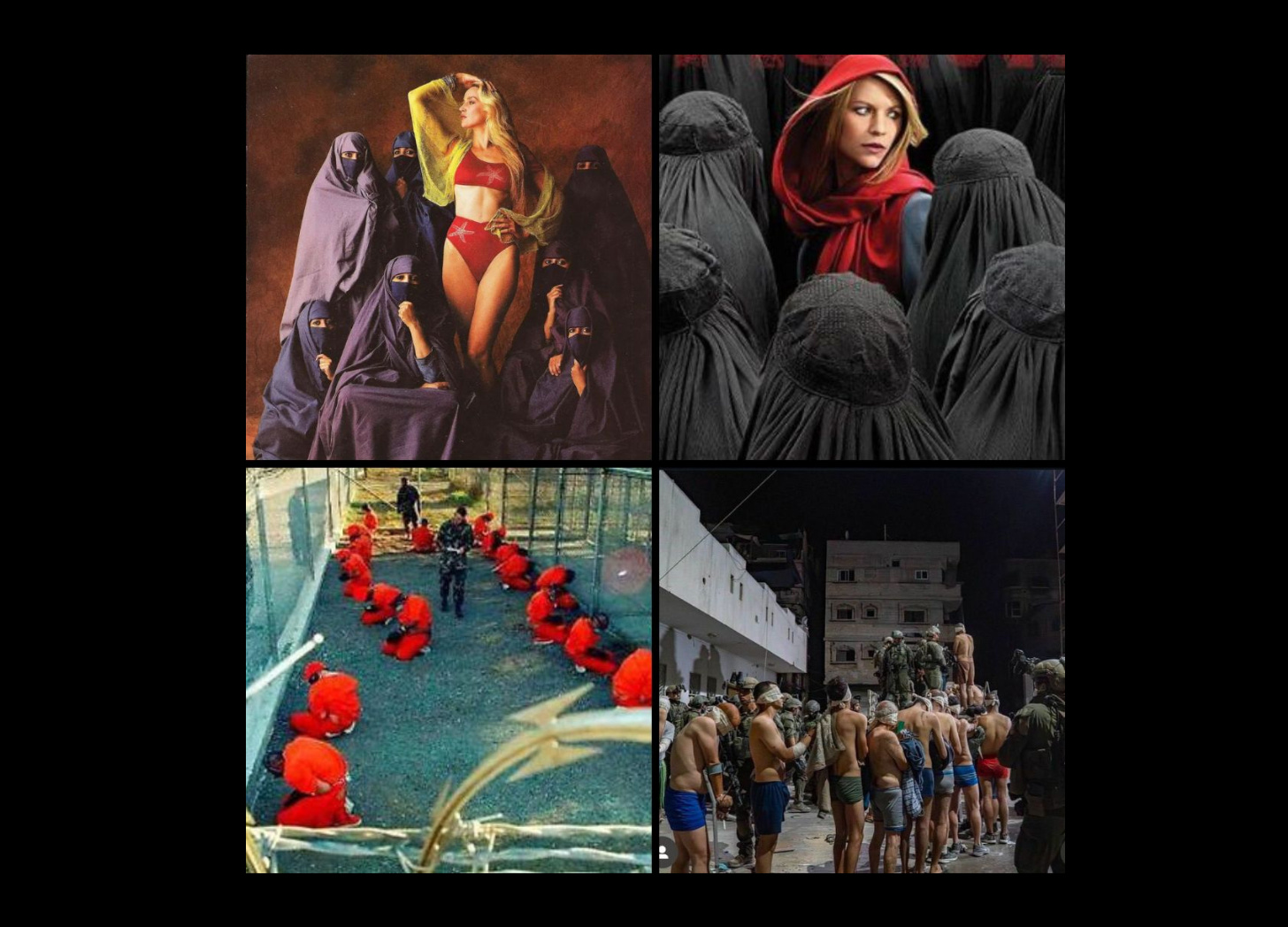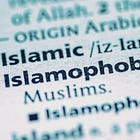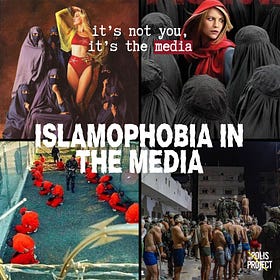The Fundamentals of Anti-Muslim Hatred
Breakdown, design logic and analysis of last week's quiz titled "Are you prejudiced against Muslims?"
Last week, I sent out a newsletter titled “Are You Prejudiced Against Muslims?” This was a short quiz that has been used to foster discussions and conversations in workshop settings. If you did not have the chance to go over it, here it is again:
I shared this pedagogical exercise because we are living in unprecedented, despairing and shocking times. The genocide of Palestinians by Israel is entering the third year. Even as reports, court cases, marches and strikes, and celebrity voices for Palestine increase, there is no core shift within media coverage and in material support for Israel. There are several intersecting sets of reasons for why we have arrived at this place, but one clear through line is that of an unceasing Islamophobia.
Even the term “Islamophobia” is insufficient and mild. “Anti-Muslim hatred” is a more appropriate term since it is born of systematic dehumanization of Muslims in the media and entertainment we consume, and in tropes that are taken for granted in Western political discourse. Undergirding this pernicious representation of Islam and Muslims that has been generated over the past many centuries is the long history of European colonialism. Unpacking anti-Muslim bias requires an investment in anti-colonial perspectives.
As I write this, Trump and Netanyahu have put forth a 20-point plan for Gaza that is so colonial, so hateful and so blatantly racist that it almost leaves you breathless. Thus, the specifically anti-Palestinian hatred is in a league of its own. But a broader current of Islamophobia that became very visible in the last couple of decades, and the ways in which surveillance technologies, carceral ideologies and rights regimes inscribe themselves onto Muslim bodies, has been further legitimized and validated with the genocide in Palestine. It has never been this bad.
With vital social and protest movements like Black Lives Matter and MeToo, anti-racism and gender equity have gained cultural importance. For example, with the uptick in awareness about anti-Blackness, people are now able to identity the kinds of language and scenarios that targets Blackness. This does not mean that anti-Black racism is still not pervasive, but there has been a perceptible cultural shift whereby certain words, comments or behaviors are not seen as a moral or correct, and this change can observed on TV or in curricular changes or on social media.
Anti-muslim hatred, however, exists in a raw form in most non-Muslim parts of the world. My personal understanding of anti-Muslim prejudice stems from many different experiences: firstly, from having lived for over two decades in the US post-9/11; secondly, from having grown up in urban India in the 80s and 90s, just as the right-wing and anti-Muslim Hindu fundamentalist movements were becoming bellicose; and lastly, from having spent time in France, where approximately 10% of population is Muslim (higher than most Western countries).
The core aspect of anti-Muslim prejudice and which makes it different from other forms of prejudice is the element of religion. Any and all understanding of Muslims is filtered through the lens of a monolithic and extremely negative notion of Islam. Twenty-five percent of our planet is inhabited by Muslims, which means approximately 2 billion Muslims live in many different parts of the world and belong to a large range of ethnic groups, races, nationalities, classes, and skin colors.
Yet, it is the religion that dictates the image of Muslims: bearded men and women with head coverings. It is the religion that dictates any understanding of politics, rights and legal structures in Muslim countries: The word “Sharia” is thrown about ominously and is made to rhyme with brutality. A key issue that attempts to understand this immensely diverse group of 2 billion people is an innate sense of knowledge about their religion - a knowledge gained from streams of books and images produced during the colonial era by white, European men. This body of knowledge was created in service of conquest, and was meant to embolden settlers and occupiers to subjugate, civilize and terrorize native populations by insisting they were primitive, irrational and uncivilized. This notion of “irrationality” is a core structural aspect of anti-Muslim hatred, and it is pitted against a deluded sense of the West’s own “rationality.”
Most of the questions in the quiz touch upon this idea for varying situations.
How does the point system work?
In order to design the quiz, I researched other existing surveys, workshop curricula and other pedagogical materials about anti-Muslim prejudice, and I found very little compared to material on anti-Blackness and gender equity.
The 20 questions were designed to engage the ways in which anti-Muslim bias shows up when we interact with individuals, and in how we consume news or forms of entertainment.
Each statement is likely to generate a unique reaction. A statement might simply feel true, it might pose a real dilemma, or it might trigger a pang of anxiety, anger or fear. Any of these reactions would mean giving yourself one point. It means that the statement resonated.
If you read a statement and found it ridiculous, offensive or if it made you roll your eyes, then you get zero points.
The more points you gain, the more anti-Muslim or Islamophobic you are. Sadly.
—If you had 5 points or less, don’t worry. You already know a lot about Muslim culture, but there is room for improvement. You can become more aware of how anti-Muslim bias functions and can probably arrive at a good understanding of how to fill some gaps in knowledge.
—If you had 10 points or more, this is concerning. You have longstanding prejudices and will have to work very hard to learn more about Islam, Muslims and their culture. You will also need to have a long, hard, critical think about your own social and cultural environment in order to do the more important work of unlearning some of those fixed views.
—If you had 15 points or more, you have a deep-seated, anti-Muslim bias. You would have to first recognize this problem and locate it’s origins. It would require a heartfelt desire to make a change within yourself by committing to a sincere and immersive learning journey.
Breaking down the statements:
You support the plans to build a new mosque in your neighborhood, but you have some concerns about noise pollution.
There is a notion that Muslims pray all the time and very loudly. Unlike clanging church bells or loud chanting in Hindu temples, the Muslim call to prayer is always depicted as disruptive.
Even when they say it is a personal choice, most Muslim women are brainwashed into wearing a hijab.
There is an unhealthy obsession with Muslim women and their clothing. The religion is seen as singularly oppressive, violent and whereby women have no voice or no choices. Ironically, Muslim women expressing themselves or stating their choice is simply not tolerated.
It is hilarious that a majority of Muslims are named Mohammed.
A very stupid joke that is a microaggression (comment seen as a “slight” that is often deemed unintentional, light and silly yet it is loaded with bias). Similar jokes are also made about the name José.
Beheadings tend to be associated with Islam because of Sharia law.
The term “Sharia law” is used and applied without any understanding in order to usually prove that Muslims have no rational legal systems. “Beheading” is associated with Islam (oddly not with France with their guillotine or England with their history of beheaded queens). Decapitation is also seen as exceptionally cruel despite the fact that several countries in the world still have the death penalty. The USA ranks in the top 5 countries for most people executed. And no, there is no good or painless death penalty. Most recently, the propaganda about Hamas and 40 beheaded babies circulated for months, despite being soundly disproven, because it simply sounds “Islamic.” Additionally, the number 40 is also associated with Islam further giving it a semblance of “truth.”
You are leading a team at work and your Muslim co-worker requests prayer time accommodations. You are culturally sensitive but find this unreasonable.
Accommodations for the religious majority in any country are built into the structure. No one is expected to work on Sunday. Holidays for Christmas or Easter are also seen as normal. Similar to new mothers who might want to have time and space for pumping breastmilk, these are seen as exceptional and overly demanding requests.
Edward Said’s famous book Orientalism is a defense of Islam.
No, it is not. Edward Said was a prolific intellectual who was often publicly maligned for his pro-Palestinian views.
A young Muslim male politician is rising to the top. He is open about being a practising Muslim. You like the guy but find the religious declarations uncomfortable.
Again, language about the religious majority in any country is built into the structure. Words like “god” in the US or the UK (“god save the king”) or evocations of “ram” in India are completely normal during election seasons. But Muslims are expected to hide their religious affiliations.
The clash of civilizations between Muslims and Christians can be traced back to the Crusades.
Colonially produced knowledge about history insists that these religions cannot get along and obfuscate key factors such as land grabs and occupations.
Two young Muslim men have moved into your building. You often see them returning late into the evening, backpacks on their shoulders. You feel a mild twinge of anxiety.
This is a holdover image from the post 9/11 era. Though less prevalent now, it was part of the message that “everywhere you turn, there is a potential terrorist cell.” Young Muslim males were turned into figures inciting fear and terror.
Your close colleague, a white woman, tells you she’s converting to Islam. She plans to marry her Muslim boyfriend. You think this is a bit much.
Understandably, if you’re not religious in the true sense of the word, any talk of conversion for marriage is a bit much. But if you’ve enjoyed entire TV shows about adorable plots where women convert to Judaism or adorable family movies about bringing over girlfriends and fiancés for Christmas, then think again.
There is Islamophobia in our societies but anti-Blackness, anti-semitism and gender inequality are the most urgent issues today.
In 2023, a 6-year old child was stabbed to death by his landlord in Chicago. Three young students were shot at in Vermont leaving one of them paralyzed for life. This was done to them because they were Palestinian and Muslim. More than 20,000 children have been killed by Israel in the last two years. The War on Terror left a death toll of over 1 million people, majority of them Muslims. In the past months, there have been instances of pig heads left outside mosques in Paris, signs of flagrant Islamophobia. The French papers report this without ever addressing the extreme levels of anti-Muslim and anti-Arab hatred in the country, and without even a nod to how fearful the community might feel about these desecrations. In fact, all the articles insert a paragraph on rising anti-semitism in order to minimize any form of sympathetic or humanized reporting about Muslims.
All religions are male-dominated and patriarchal but Islam is particularly oppressive towards women.
This is an effect of pervasive propaganda that started during colonial times. For example, European women held “de-veiling” ceremonies for Muslim women. The agenda of “saving Muslim women” remains an important tool for drumming up violent interventions. The US war in Afghanistan was meant to save women from the Taliban. Twenty-two years later, we know it was a lie.
It is sad that there are no democratic Muslim-majority countries.
There are plenty. Do your research. Along the way, ask how your own democratic government is doing.
Muslims really cannot take a joke: remember all those controversies with the cartoons?
A typical microaggression. Most racist and sexist comments are passed off as jokes and the subject is told to relax, take it easy, spare a laugh, and so on.
Fundamentalist Islam is one of the main reasons there is so much violence in the world.
Today, there is so much violence in the world almost unilaterally because of the US and Europe. There is a clean historical line from the settler colonial genocides of native peoples worldwide to the era of the Cold War to present day.
The Ramadan fasting is cruel. They always force the little kids to do it too.
Typical “othering” of Muslims even though all religions have fasting rituals and the usual obsession with the idea of Islam as cruel.
Unfortunately, Muslims living in the West are not quite as compatible with the Western way of life as other non-Western people.
A combination of factors: negative stereotyping of Muslims, the practice of their faith as synonymous with terrorism, and a general dislike for migrants.
Muslims do not know how to keep religion separate from politics, government and the state. They should be more secular.
There is no awareness of how religious language and culture is built into the structure of all governments.
Al Jazeera news network has a Muslim bias.
With its Arabic name, location and ability to report from Muslim countries, they are constantly under fire. Israel has now banned the network and has systematically killed all its journalists in Gaza. The US, also, specifically targeted and killed Al Jazeera journalists during the 2003 Iraq war.
Islamic culture is rooted in religion and Western culture is rooted in rationality.
A pervasive idea left over from colonially produced knowledge purporting European and Christian superiority. It is inbuilt into media and entertainment representation of Muslims.
You have read less than 3 books (fiction or non-fiction) about Muslim history, Muslim life and Muslim people written by Muslim writers.
Muslim writers writing about themselves are seen as unreliable and biased narrators. White male writers without language skills or lived experience of Muslim places are seen as objective. Lot of evidence available in the histories of publishing, film, academia, journalism and more.
Many of the fundamentals of anti-Muslim hatred have been explored in this newsletter. For those interested in the “room for improvement” category, I hope this might be a guide for you to curate your own learning journey.
Love and solidarity❤️🔥
Bhakti Shringarpure
PS: Here’s a relevant podcast I participated in and it also lists some books and articles for further reading.
Islamophobia in the Media
The hosts embark on a detailed breakdown of Islamophobia, dissecting its historical roots, modern manifestations, and the critical role the media plays in perpetuating anti-Muslim sentiment. They examine how Islamophobia has evolved from colonial narratives into a sophisticated mechanism of systemic hatred, embedded in global power structures. The episo…






This is correct. Islamophobia is the fear of and connotates a mental disorder. Hate is more appropriate for this bogotry.
The conflict is not an emotional "hatred" that can be unlearned; it's the cold, rational response of a dominant world order to its only ideological competitor. Until you understand that Islam is not a "religion" but a complete system, your analysis will remain tragically superficial.
https://open.substack.com/pub/thesystemdispatch/p/islam-is-not-a-true-religion?r=69toat&utm_campaign=post&utm_medium=web&showWelcomeOnShare=false